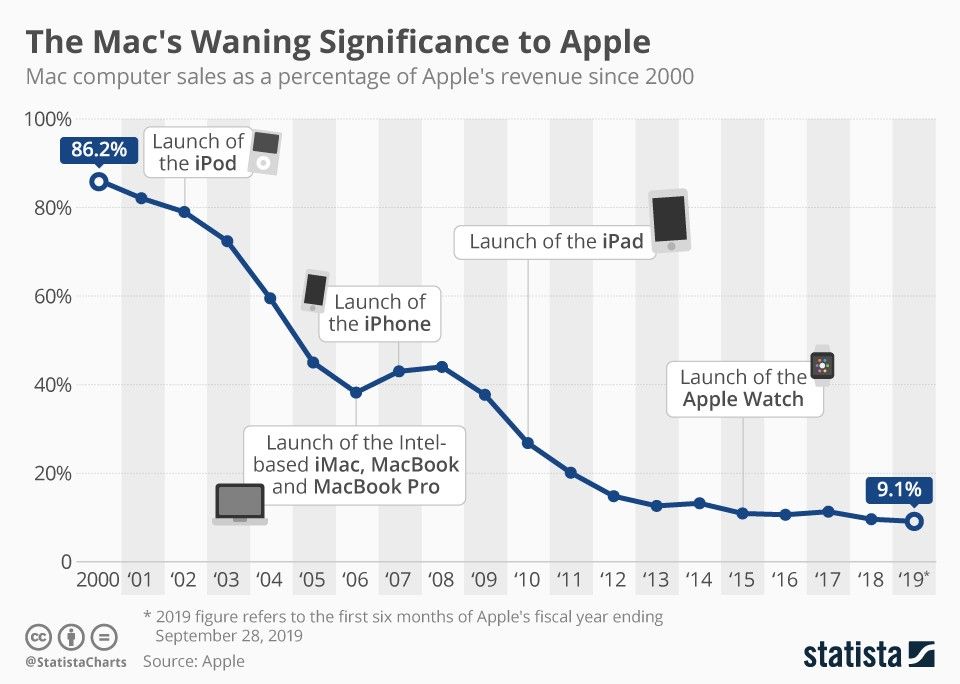How Apple Died With Steve Jobs
They lost their best competitor

When Steve Jobs died, Apple stopped competing. With itself.
Steve Jobs great skill was relentless internal competition. Whereas Bill Gates was focused out, Jobs was focused in. If Jobs was a Hindu god he would be Shiva, the destroyer.
Under Jobs, the iMac killed the Macintosh. The iPhone killed the iPod. While Steve Jobs was around, nobody drove Apple out of business but Apple. That is what has made Apple so incredibly valuable. Since he died they have lost that internal competitive drive, and it shows.
Steve Jobs’ Killer Instinct
When Apple kicked out Steve Jobs in 1985, they were in a similar situation. For years they happily made money, introducing multiple product lines at high prices. However, after about a decade, the innovation in the tank started to run out. Because they weren’t competing with themselves, other companies began to match and exceed them and they almost went bankrupt.
Then Apple brought Steve Jobs back in 1997. He (and Jony Ive) effectively killed their own fragmented PC line with the all-in-one iMac, released in 1998, and their Intel based models. But Jobs’ competition with Apple had only just begun. He was about to turn the entire idea of a PC on its head.
In 2001 desktops and laptops were 86% of Apple’s business. It was still 90% of anybody’s business. There was no other computer business because those markets didn’t exist yet. To move your business away from your business is usually as stupid as it sounds, but that’s what Steve Jobs did.
In 2001 Apple released the iPod, which was decidedly not a PC, and that went on to sell over 100 million units in six years. They then released the iTunes store for digital music, which became the world’s largest music retailer in two years. This completed the seamless marriage of hardware and software that Apple was known for, delivering an integrated product. But of course Apple didn’t stop there. While this music business was still profitable — Steve Jobs went ahead and killed that as well.
In 2007 Apple launched the iPhone which has grown to completely replace the need for an iPod, which only survives today as a disabled iPhone to give children. With this, the iPad and later the Watch, Apple successfully moved into the post-PC era, which was amazing because they were a PC company. As Steve Jobs said a year before he died:
- Post PC era- Apple is the first company to get here
- Post PC products now 66% of our revenues — iPad outsold Mac within 6 months
- Post PC era = more mobile (smaller, thinner, lighter) + communications + apps + cloud services (QZ)

And of course the numbers bear it out. Apple went from being an 86% PC business in 2001 to a 9% PC business in 2019.
In hindsight this seems obvious, and the results are great, but pivoting a giant, publicly-held company like this is very, very difficult. Internally this would have pissed off a lot of managers who had PC-based targets, and board members who would say ‘focus on the core business’, and suppliers, and even customers. Internal competition is actually more difficult than external because you’re competing against your friends and partners, and murdering their darlings. But Steve Jobs did it, and grew the pie for everyone. His shareholders, his staff, even external competitors. By being unafraid to kill his company’s own products, he harnessed the best forces of creative destruction within Apple.
However, God (or whatever) is the greatest force of creative destruction of all. In 2011, Steve Jobs died. And no one has come close to replacing him yet. Certainly not within Apple.
Losing The Killer Instinct
In his “Top 100 — A” memo, said “Apple is in danger of hanging on to old paradigm too long (innovator’s dilemma)”. That is almost exactly what happened since his death.
If you read through that memo, a lot of things that he’s planned haven’t happened. He talked about cloud, but Apple is incredibly weak there. Seriously open iCloud. It looks like it hasn’t been updated since the 90s.
The sad thing is that the ingredients for a post-mobile era are there. The Apple Watch and Airpods are amazing hardware that could be the gateway to a brilliant AI powered cloud. However, the Watch and Airpods are tethered to the iPhone, which is all wrong. They should be the products that killed the iPhone. Instead they’re iPhone accessories, connecting to Siri as an afterthought.
This is a conservative view, it preserves the iPhone business while introducing new products. But this is not what made Apple great. You can clearly see that Apple lacks the internal competitor to go after the iPhone hard and make it irrelevant. Google and even Amazon have leapfrogged ahead into this post-mobile future, while Apple has lost itself in beautifully chamfered edges.
Without Steve
It’s sad really, because Jobs could see a post-mobile era as much as he saw a post-PC era. Under Tim Cook, Apple has become a very expensive, very profitable company in what appears to be a mature market. If you make a graph of profits and price, they are pursuing a hard-right policy, just as they did the first time Apple lost Jobs.
This time, however, no amount of Apple stock can bring him back. There is no negotiating with death. It’s very sad really. For his family, for the company, for humanity. Who knows what more he could have created? He created a great company, which lives on, but without its greatest competitor.